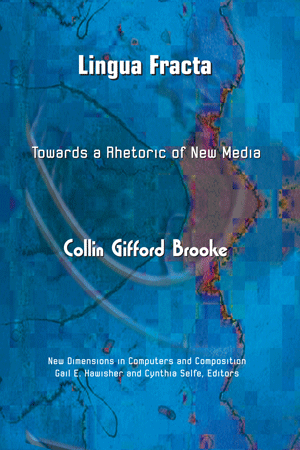Brooke, Collin Gifford. Lingua Fracta: Towards a Rhetoric of New Media.
Cresskill, NJ: Hampton P, 2009. 222 pp, ISBN 9781572738935
Reviewed by Kerri Hauman, Bowling Green State University

CHAPTERS 6-8 |
|
Because Memory has often been treated as an irrelevant canon, Brooke makes more explicit connections between “Persistence” – his new term for Memory – and the idea of ecologies of practice in Chapter 6. He argues that memory is perhaps the canon in most dire need of revision in order to allow us to see it as practice. He demonstrates that we often think of memory in terms of presence and absence and argues that we need to move beyond this account and consider an additional axis of memory: pattern/randomness. Building on ideas from Chapter 4, he argues that memory should be viewed “not simply as the storage of data, but also in terms of the construction of pattern” (144). In light of the concern for information overload, Brooke examines RSS feeds, already existing new media tools, to illustrate how they enact both the presence/absence and pattern/randomness axes of memory. Brooke concludes the chapter with a particularly interesting and revealing example of the way tagclouds have been used to trace the use of terms in presidential speeches from 1776-2006. The tagcloud project he discusses illustrates how new media tools already serve as both functions of storage and tools that allow us to perceive connections and trace patterns across multiple sources. Chapter 7 focuses on the final, also often neglected, canon of Delivery, which Brooke recasts as “Performance.” He critiques Trimbur’s and Welch’s recent attempts to update the canon because, he claims, they both cast writing as a product to be transmitted, which fails to “[account] for the constitutive force of delivery” (170). An important part of his argument in this chapter is his critique of technological determinism. As an example, he claims that instructors often fail to see the real potential of Wikipedia as an example of delivery as both practice and performance because of their inability to move beyond seeing the page as an extension of a traditional encyclopedia. He argues that we could, instead, be looking at the history and discussion pages to fully understand the ongoing performance of delivery on Wikipedia. In the final chapter, Brooke reasserts his primary concern that we need to develop a more productive language with which we can talk about new media. He begins this chapter with a quote from Nietzsche about a rare book that could serve as “the first language for a new series of experiences” (195), suggesting that his book provides a useful starting point from which we can begin to use this new language in order to engage in more productive conversations about new media. For Brooke, more productive conversations are ones that answer questions about function, value, and practice rather than merely providing definitions.
|